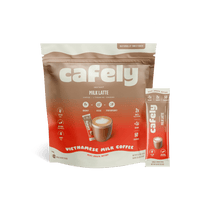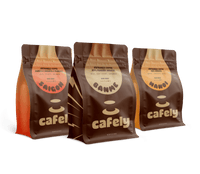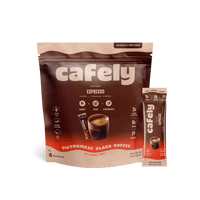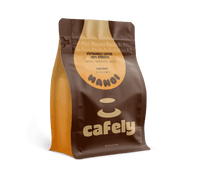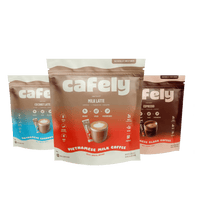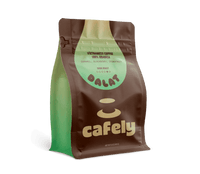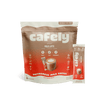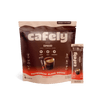Did you know that over 70% of your immune system is in your gut [1]?
Your digestive system isn’t just about breaking down food. It plays a critical role in everything from mood regulation to inflammation control and even energy production.
But a happy gut doesn’t happen by chance. It’s built with small, consistent habits that nourish your microbiome, reduce stress on your digestive tract, and support overall balance.
If you’ve been searching for gut health tips that go beyond generic advice, here are 10 practical, research-backed hacks to help you improve gut health naturally, starting today.
10 Healthy Gut Habits For a Better Life
Starting with small steps is the way to a better, healthier life.
With these healthy gut habits, you can start to see improvement from day one:
1. Eat More Fermented Foods
Fermented foods are some of the richest natural sources of probiotics, which are live beneficial bacteria that support a healthy microbiome [2].
When consumed regularly, they help balance gut flora, crowd out harmful bacteria, and even support digestion by enhancing enzyme production.
Probiotic-rich foods can also support immune function, reduce inflammation, and even influence mood through the gut-brain connection.
Adding these foods into your daily or weekly meals is one of the simplest, most effective ways to nourish your gut naturally, with benefits that go far beyond digestion.
2. Take a High-Quality Probiotic Supplement

While whole foods should always come first, a probiotic supplement can be a helpful addition, especially after antibiotics, food poisoning, or a digestive illness [3].
Probiotic supplements work by replenishing your gut with beneficial bacteria, helping restore microbial diversity and stability. They’re especially useful during periods of stress, poor diet, or illness, when your natural microbiome may be compromised.
Regular use of a high-quality probiotic may also support more consistent digestion, reduce bloating, and strengthen your immune system, making it a smart tool in your gut health toolkit when used strategically.
3. Add Prebiotic Fiber to Your Diet
Probiotics are only part of the equation. They need fuel to thrive — and that’s where fiber comes in.
Prebiotics are specialized fibers that resist digestion in your upper gastrointestinal (GI) tract and are fermented by the beneficial bacteria in your colon.
This fermentation process feeds your good bacteria, helping them multiply and produce beneficial compounds like short-chain fatty acids (SCFAs), which play a major role in gut lining health and inflammation control [4].
A diet rich in prebiotic fiber can improve regularity, reduce bloating, and enhance nutrient absorption.
Over time, this helps create a more stable and diverse microbiome, one of the most important foundations of lasting gut health.
4. Limit Added Sugar & Artificial Sweeteners
If you want a healthy gut, sugar is your worst enemy. Excess sugar feeds inflammatory gut bacteria and yeast like Candida albicans, which can throw off your microbial balance and contribute to gas, bloating, and cravings [5].
Artificial sweeteners found in sodas such as aspartame, sucralose, and saccharin may also disrupt gut flora, according to several studies. They can reduce beneficial bacteria and trigger glucose intolerance, even without calories.
If you typically sweeten your coffee just to make it drinkable, it might be time to rethink the blend itself. Healthy coffee options offer clean, smooth energy.
For example, dark roast robusta coffee — especially beans like HaNoi 100% Robusta — contains more antioxidants and offers smoother, less acidic energy compared to overly roasted or heavily processed options. This makes them a gut-friendlier choice, without needing sugar or syrups to taste good.
Try replacing sugary snacks with fruit and nut combinations, and opt for natural sweeteners like stevia or monk fruit in moderation.
5. Chew Your Food Thoroughly
Digestion doesn’t start in the stomach — it begins in your mouth. When you chew thoroughly, you mechanically break down food and mix it with saliva, which contains enzymes that kick-start digestion [6].
Benefits of mindful chewing:
- Reduces the burden on your stomach and intestines
- Helps prevent bloating and gas
- Gives your body time to release digestive hormones
Aim to chew each bite 15 to 30 times and slow down while eating. It’s one of the simplest but most overlooked gut health tips you can implement today.
6. Manage Stress Regularly
Your gut and brain are in constant communication via the vagus nerve, which means chronic stress can disrupt digestion, impair nutrient absorption, and alter your gut flora [7].
Signs of stress-related gut issues:
- Bloating or cramps during high-stress periods
- Appetite changes (either overeating or lack of hunger)
- Worsening IBS symptoms or irregular bowel movements
Tips for reducing stress:
- Daily breathwork or meditation (even 5 minutes)
- Gentle yoga or walking outdoors
- Journaling or time in nature
Managing stress isn’t just a mental health win — it’s a proven gut health hack that supports both resilience and digestive balance.
7. Stay Active Daily
Regular movement promotes better digestion by stimulating intestinal contractions, reducing inflammation, and improving insulin sensitivity [8].
Some forms of exercise that benefit gut health:
- Walking — After meals to reduce blood sugar and bloating
- Activities — Cycling, swimming, or yoga can enhance circulation
- Resistance Training — Short, moderate sessions to support muscles and metabolism
You don’t need intense workouts to see results. Just 20 to 30 minutes a day of light-to-moderate movement can improve gut motility and help you feel more energized and regular.
8. Get Enough Sleep
Poor sleep doesn’t just affect your mood — it’s been linked to microbial imbalances, increased gut permeability (“leaky gut”), and lower microbial diversity [9].
Studies show that just one night of poor sleep can:
- Disrupt insulin response
- Reduce the abundance of beneficial bacteria
- Increase gut inflammation markers
To improve gut health, try to incorporate these healthy sleep habits:
- 7 to 9 hours of sleep nightly
- A consistent bedtime and wake-up time
- Reducing screen time and blue light exposure at night
Good sleep is one of the most underrated, but powerful, natural gut health remedies available — partly because it’s free and non-trendy. It’s often overlooked in favor of supplements or diet tweaks, even though it plays a foundational role in gut repair and regulation.
9. Stay Hydrated
Water helps keep your entire digestive tract running smoothly [10]. It softens stool, aids in nutrient absorption, and ensures the mucosal lining of the gut remains intact.
Tips for improving daily hydration:
- Start your day with a full glass of water
- Carry a refillable bottle with you
- Add electrolytes if you’re sweating or drinking caffeine
Try to sip water throughout the day instead of chugging all at once. Even your best morning coffee ritual can influence this balance. While some brews support digestion, others — especially those high in sugar or additives — may disrupt it.
Take a look at these amazing coffee facts to see how your daily cup might be helping (or hindering) your gut.
10. Rotate Foods for Microbiome Diversity
Your gut thrives on variety. Eating the same meals repeatedly can lead to a less diverse microbiome and increased food sensitivities over time. By rotating foods regularly, you support different bacterial strains and boost your resilience [11].
Easy ways to diversify your food:
- Alternate between different grains (e.g., oats, quinoa, millet)
- Mix up protein sources (e.g., lentils, eggs, fish, tofu)
- Eat a “rainbow” of vegetables and fruits each week
- Include global cuisines that use varied spices and ingredients
A diverse microbiome is a strong microbiome. Make it a goal to try one new food per week, and rotate ingredients seasonally to improve both gut health and overall well-being.
Top 10 Supplements & Foods to Improve Gut Health
A well-functioning gut is the foundation of your health, from nutrient absorption and immunity to hormone regulation and even mental clarity. But no food or supplement can do it all.
Supporting your gut means creating an environment where your microbiome thrives, your digestive tract repairs itself efficiently, and food gets broken down with ease.
Here are 10 of the best natural gut health remedies— including foods, herbs, and supplements — backed by research and expert consensus.
1. Probiotics
Probiotics are living microorganisms that help restore and maintain the balance of beneficial bacteria in your gut. Let’s take a look at some of the best sources of probiotics.
Probiotic Supplements with Diverse Strains
For example, Lactobacillus, Bifidobacterium, and Saccharomyces boulardii. Each strain offers different benefits — for example, Lactobacillus helps produce lactic acid and aids digestion, Bifidobacterium supports the immune system and gut lining, and S. boulardii is especially helpful for diarrhea and travel-related digestive issues.
Choosing a supplement with multiple strains ensures broader support, providing your gut with more benefits long term.
Fermented Foods
Foods like kefir, yogurt, sauerkraut, kimchi, and kombucha. These are natural sources of probiotics and can help maintain gut health when consumed regularly.
Choosing the Right Probiotic Supplement
Choose a supplement with at least 10 billion CFUs (colony-forming units) per dose to ensure a high enough population of active bacteria.
Also, check whether the product is shelf-stable or requires refrigeration, as this affects how well the bacteria survive until they reach your gut.
A good probiotic supplement can serve as a reliable, foundational tool in any gut health routine, especially when diet alone is not enough.
2. Prebiotic Fiber

You can take all the probiotics you want — but without prebiotics, they won't thrive. Prebiotics partner with your good bacteria and support their ability to reduce inflammation and fortify your gut lining.
Top prebiotic foods include:
- Chicory root
- Garlic
- Onions
- Leeks
- Asparagus
- Jerusalem artichokes
- Green bananas
- Oats
- Barley
- Flaxseeds
A diet rich in prebiotic fiber is one of the most effective gut health tips for keeping your microbiome active and diverse.
3. L-Glutamine
L-Glutamine is an amino acid that serves as a primary fuel source for the cells lining your intestines. It plays a critical role in healing a damaged gut barrier, making it a top pick for those with leaky gut, IBS, or inflammation [12].
Benefits of L-glutamine:
- Supports the regeneration of the intestinal lining
- Reduces gut permeability
- Aids recovery from illness, stress, or overtraining
Available in capsule or powder form, glutamine is often used in gut-healing protocols for its role in sealing tight junctions and maintaining gut wall integrity.
4. Magnesium
Magnesium helps regulate muscle contractions, including the smooth muscles of your gastrointestinal tract [13]. If you struggle with sluggish digestion, bloating, or constipation, a gentle form of magnesium can help restore motility and fluid balance.
Best forms of magnesium for gut support:
- Magnesium Citrate— For occasional constipation
- Magnesium Glycinate — For stress-related digestive issues
- Magnesium Malate — For energy production
Beyond digestion, magnesium supports stress reduction, sleep, and inflammation, making it a multifunctional mineral in your arsenal of healthy gut habits.
5. Bone Broth
Bone broth is rich in collagen, gelatin, and amino acids like glycine, glutamine, and proline — all of which help repair the gut lining and reduce inflammation [14].
Key gut benefits of bone broth:
- Supports the healing of the intestinal mucosa
- Improves joint and skin health
- Provides easily absorbable nutrients
Whether sipped warm or added to soups and stews, bone broth is a natural, food-based way to boost gut health and soothe irritation from within.
6. Fermented Foods
While probiotic supplements are concentrated, fermented foods offer a whole-food approach to replenishing your gut [15]. These foods don’t just provide beneficial bacteria — they also include enzymes and bioavailable nutrients that aid digestion.
Great choices of fermented foods include:
- Kimchi
- Sauerkraut
- Miso
- Tempeh
- Pickled vegetables (look for “raw” or “unpasteurized”)
- Kombucha
Eating fermented foods a few times a week is one of the most sustainable, low-maintenance gut health hacks you can adopt, especially when paired with prebiotics.
7. Slippery Elm
Slippery elm is a tree bark used in traditional herbal medicine to soothe inflamed or irritated digestive tracts [16]. It becomes mucilaginous (gel-like) when mixed with water, which allows it to coat the stomach and intestines.
Benefits of slippery elm:
- Relieves heartburn, indigestion, and mild diarrhea
- Protects and nourishes the gut lining
- May ease IBS symptoms
It’s often found in powders, teas, or capsules. For those seeking natural gut health remedies, especially for occasional flare-ups, slippery elm is a gentle but powerful option.
8. Digestive Enzymes
If your meals often leave you feeling bloated, gassy, or heavy, your body might not be producing enough digestive enzymes.
These proteins help break down food into absorbable nutrients, and supplementing with them can improve both comfort and nutrient uptake [17].
Look for digestive enzyme blends that include:
- Amylase (for carbs)
- Protease (for protein)
- Lipase (for fats)
- Lactase (for dairy)
Taken before meals, digestive enzymes can support smoother digestion and reduce post-meal discomfort, especially for those with low stomach acid or pancreatic insufficiency.
9. Zinc Carnosine
This unique compound combines zinc (an essential mineral) with carnosine (a dipeptide) to form a supplement that supports mucosal healing and maintains the integrity of the gut lining [18].
Key benefits of zinc carnosine:
- Aids in the healing of gastric ulcers and inflammation
- Protects intestinal cells from oxidative stress
- May improve symptoms of leaky gut and gastritis
Zinc carnosine is commonly used in clinical settings to support gut repair, making it an evidence-based tool for those looking to improve gut health at the structural level.
10. Polyphenol-Rich Foods
Polyphenols are plant compounds that act as prebiotics — they’re digested by gut microbes and used to produce beneficial short-chain fatty acids [19]. They also have strong antioxidant and anti-inflammatory properties.
Polyphenol-rich foods to include:
- Berries (especially blueberries and raspberries)
- Green tea and matcha
- Red grapes and pomegranates
- Dark chocolate (70%+ cocoa)
- Olive oil and flaxseed oil
These foods support microbial balance, reduce gut inflammation, and help with metabolic health — all of which contribute to a healthy gut and a more resilient body.
Things That Are Detrimental to Gut Health

Many everyday habits can quietly harm your gut without showing immediate symptoms. From stress to processed foods, here are the key culprits to watch out for.
1. Excessive Antibiotic and NSAID Use
While antibiotics save lives, they can also wipe out good gut bacteria along with the bad. Studies show that even one course can alter your microbiome for months [20].
NSAIDs (like ibuprofen) are another hidden threat. Frequent use can damage the gut lining, increasing inflammation and permeability.
Gut health hack: If you must use either antibiotics or NSAIDs, pair them with gut-repairing foods or supplements like L-glutamine and probiotics to support your gut throughout the process.
2. Chronic Stress
Stress doesn’t just live in your head. It affects your digestive system through the gut-brain axis. When cortisol levels spike, digestion slows, the microbiome changes, and the gut lining can become compromised.
Gut health hack: Stress management techniques like meditation, breathwork, and even laughter may help reduce inflammation and keep your gut-brain connection healthy.
3. Diets High in Processed Foods or Low in Fibre
Ultra-processed foods often contain additives, preservatives, and artificial sweeteners that disrupt gut flora. On top of that, low-fibre diets starve your good bacteria, reducing diversity and gut resilience.
Gut health hack: Trade processed snacks for whole, plant-based options. Aim for at least 25 to 30 grams of fiber per day from varied sources like oats, beans, and berries.
4. Poor Sleep Habits
Sleep and gut health have a two-way relationship. Irregular or inadequate sleep can reduce microbiome diversity and trigger low-grade inflammation in the gut. Poor sleep also worsens digestion and blood sugar balance.
Gut health hack: Aim for 7 to 9 hours of uninterrupted sleep each night, reduce blue light exposure after dark, and maintain a consistent sleep schedule.
5. Alcohol & Artificial Sweeteners
Alcohol — especially in excess — disrupts microbial balance and can damage the gut lining. Meanwhile, artificial sweeteners like sucralose or aspartame may feed harmful bacteria or reduce beneficial strains, according to emerging research.
Gut health hack: Cut back on alcohol, limit sweeteners, and choose natural alternatives like monk fruit or stevia in moderation.
Signs Your Gut Isn’t Happy
If your gut's ecosystem is out of balance, it doesn't just show up as stomach pain; there are a host of other symptoms that may indicate that your gut microbiome is off.
Here are the top warning signs that your gut might be in trouble [21]:
- Digestive Distress — Frequent bloating, gas, or constipation are some of the most common signs of gut dysfunction. But less obvious ones — like low mood, skin flare-ups, or sugar cravings—can also signal microbiome imbalances.
- Food Intolerances or Sensitivities — If certain foods start making you feel unwell — especially dairy, gluten, or high-FODMAP foods — it could be a sign of poor microbial diversity or a compromised gut lining.
- Skin Issues — Conditions like acne, rosacea, and eczema often flare when your gut health is off. Inflammatory responses in the gut can manifest externally.
- Brain Fog, Fatigue, or Mood Swings — The gut produces about 90% of the body's serotonin and has a major role in energy metabolism. When it's inflamed or imbalanced, mental and emotional fatigue often follows.
- Sugar Cravings — An overgrowth of yeast or bad bacteria like Candida albicans may drive powerful sugar cravings.
- Weakened Immune System— Frequent infections or slow recovery times can be signs that your gut — where 70% of your immune system lives — isn’t doing its job.
When to See a Doctor About Gut Health
Sometimes lifestyle changes aren’t enough. These are red flags that indicate a need for medical evaluation.
1. Persistent Digestive Issues
If bloating, diarrhoea, or constipation persist for several weeks or worsen, it’s time to seek help. You shouldn’t feel discomfort after most meals, nor should gut issues interfere with daily life.
2. Sudden Weight Loss or Appetite Changes
Significant, unexplained shifts in weight or appetite can point to malabsorption, inflammation, or a more serious gastrointestinal condition.
3. Blood in Stool or Black Stools
Bright red blood may indicate bleeding in the lower gut; dark, tarry stools suggest upper GI bleeding. Either symptom requires immediate attention.
4. Signs of Nutrient Deficiency
Hair thinning, pale skin, brittle nails, or fatigue may be signs that your gut isn’t absorbing key vitamins or minerals, often the result of chronic inflammation or leaky gut.
5. Suspected Food Intolerances or Allergies
If you frequently experience bloating, skin rashes, headaches, or digestive discomfort after eating certain foods, an underlying intolerance or allergy may be at play. Identifying and managing these properly requires professional testing and guidance.
6. Frequent Illness or Infections
If you're constantly getting sick, your gut may be compromising your immune defenses. Prolonged dysbiosis (imbalance in the microbiome) can reduce immune cell production and increase susceptibility.
7. Mental Health & Gut Connection
Depression, anxiety, and brain fog that coincide with digestive distress may indicate gut-brain axis dysfunction. A professional can assess both mental and physical aspects holistically.
8. Family History of GI Disorders
If close relatives have conditions like Crohn’s disease, ulcerative colitis, celiac disease, or colon cancer, it’s smart to be proactive with testing and screening.
Keep Building Gut-Healthy Habits

If this piece made you pause and rethink your routines, that’s a good thing.
Sometimes gut health tips are as simple as “cut the sugar” or “get more sleep,” but what truly matters is consistency and listening to your body.
If you’re already working on your healthy gut habits, now’s a great time to layer in food-based remedies and smart supplement choices.
And if your symptoms persist or worsen, don’t tough it out alone — talking to a professional could give your gut exactly what it needs to heal and thrive.
10 FAQs About Gut Health
If you still have questions about how to improve your gut health, no problem. We’ve collected the most frequently asked questions to help you get the answers you need most.
1. What Is Gut Health?
Gut health refers to the balance and function of microorganisms in your digestive tract. A healthy gut helps with digestion, immunity, nutrient absorption, and even brain function. When your gut microbiome is diverse and stable, your overall well-being tends to follow suit.
2. Can Gut Health Affect Mood?
Yes, thanks to the gut-brain axis. Your gut produces key neurotransmitters like serotonin, which influence mood, sleep, and stress resilience. An imbalanced gut can contribute to anxiety, brain fog, or low mood, so improving gut health may help support mental well-being too.
3. How Do I Know If My Gut Is Unhealthy?
Common signs of poor gut health include bloating, gas, constipation, diarrhea, food intolerances, sugar cravings, skin breakouts, and low energy. If these symptoms are frequent, your gut may need extra support through a better diet, natural gut health remedies, or medical guidance.
4. Are Probiotics Safe for Everyone?
Most people tolerate probiotics well, but if you’re immunocompromised or on certain medications, it’s smart to consult a healthcare provider first. Choose strains backed by research, and start with lower doses to let your gut adjust gradually.
5. How Long Does It Take to Improve Gut Health?
Some people notice better digestion or energy within a few weeks of making healthy gut habits stick. But deeper changes — like rebuilding the gut lining or restoring microbiome diversity — can take several months. Consistency with diet, sleep, and stress reduction matters most.
6. Do I Need Supplements for Gut Health?
Not always. Whole foods like fermented veggies, fiber-rich produce, and gut-friendly teas often do the job. But in cases of chronic stress, low immunity, or recent antibiotic use, targeted gut health supplements (like probiotics or L-glutamine) can offer extra support.
7. Is Fiber Good for Gut Health?
Absolutely. Prebiotic fiber feeds beneficial gut bacteria and keeps things moving smoothly through your digestive tract. Aim for a mix of soluble and insoluble fiber from sources like oats, lentils, berries, and leafy greens to improve gut health naturally.
8. Can Antibiotics Harm My Gut?
Yes. While they’re important for fighting infection, antibiotics can also wipe out beneficial bacteria in your gut. Taking probiotics during and after treatment — and eating fermented or fiber-rich foods — can help rebuild your microbiome and restore gut balance.
9. Does Drinking Water Help Gut Health?
Yes. Proper hydration keeps your digestive system running efficiently and helps fiber do its job. It also supports the mucosal lining of the gut, which acts as a barrier against toxins and pathogens. Drink plenty of water throughout the day — not just at meals.
10. What’s the Best Diet for Gut Health?
A gut-friendly diet is rich in plants, fiber, fermented foods, and healthy fats, while low in added sugars, alcohol, and ultra-processed meals. Variety matters: rotating fruits, vegetables, grains, and legumes keeps your microbiome diverse and your digestion happy.
References:
- Wiertsema, S. P., van Bergenhenegouwen, J., Garssen, J., & Knippels, L. M. J. (2021). The Interplay between the Gut Microbiome and the Immune System in the Context of Infectious Diseases throughout Life and the Role of Nutrition in Optimizing Treatment Strategies. Nutrients, 13(3), 886.
- Leeuwendaal, N. K., Stanton, C., O'Toole, P. W., & Beresford, T. P. (2022). Fermented foods, health, and the gut microbiome. Nutrients, 14(7), 1527.
- Tompkins, T., Mainville, I., & Arcand, Y. (2011). The impact of meals on a probiotic during transit through a model of the human upper gastrointestinal tract. Beneficial Microbes, 2(4), 295–303.
- Davani-Davari, D., Negahdaripour, M., Karimzadeh, I., Seifan, M., Mohkam, M., Masoumi, S., Berenjian, A., & Ghasemi, Y. (2019). Prebiotics: Definition, Types, Sources, Mechanisms, and Clinical Applications. Foods, 8(3), 92.
- Arnone, D., Chabot, C., Heba, A.-C., Kökten, T., Caron, B., Hansmannel, F., Dreumont, N., Ananthakrishnan, A. N., Quilliot, D., & Peyrin-Biroulet, L. (2021). Sugars and gastrointestinal health. Clinical Gastroenterology and Hepatology, 20(9).
- Sensoy, I. (2021). A review on the food digestion in the digestive tract and the used in vitro models. Current Research in Food Science, 4(4), 308–319.
- Konturek, P. C., Brzozowski, T., & Konturek, S. J. (2011). Stress and the gut: pathophysiology, Clinical consequences, Diagnostic Approach and Treatment Options. Journal of Physiology and Pharmacology: An Official Journal of the Polish Physiological Society, 62(6), 591–599.
- Mishra, S. (2013). Effect of Physical activity on Insulin Resistance, Inflammation and Oxidative Stress in Diabetes Mellitus. JOURNAL of CLINICAL and DIAGNOSTIC RESEARCH, 7(8).
- Appleton, J. (2018). The Gut-Brain Axis: Influence of Microbiota on Mood and Mental Health. Integrative Medicine: A Clinician’s Journal, 17(4), 28.
- Sato, K., Sato, K., Sato, K., Sato, K., & Sato, K. (2024). Sufficient Water Intake Maintains the Gut Microbiota and Immune Homeostasis and Promotes Pathogen Elimination. IScience, 27(6), 109903–109903.
- Valentino, V., Magliulo, R., Farsi, D., Cotter, P. D., Orla O'Sullivan, Ercolini, D., & De Filippis, F. (2024). Fermented foods, their microbiome and its potential in boosting human health. Microbial Biotechnology, 17(2).
- Kim, M.-H., & Kim, H. (2017). The Roles of Glutamine in the Intestine and Its Implication in Intestinal Diseases. International Journal of Molecular Sciences, 18(5), 1051.
- Aniebo Umoh, E., Obembe, A. O., Ikpi, D. E., Ekpenyong Eniang-Esien, O., Okon Asuquo, J., & Effiom-Ekaha, O. O. (2023). Effect of chronic administration of magnesium supplement (magnesium glycinate) on male albino wistar rats’ intestinal (Ileum) motility, body weight changes, food and water intake. Heliyon, 9(8), e19042.
- Mar-Solís, L. M., Soto-Domínguez, A., Rodríguez-Tovar, L. E., Rodríguez-Rocha, H., García-García, A., Aguirre-Arzola, V. E., Zamora-Ávila, D. E., Garza-Arredondo, A. J., & Castillo-Velázquez, U. (2021). Analysis of the Anti-Inflammatory Capacity of Bone Broth in a Murine Model of Ulcerative Colitis. Medicina, 57(11), 1138.
- Pyo, Y., Ki Han Kwon, & Yeon Ja Jung. (2024). Probiotic Functions in Fermented Foods: Anti-Viral, Immunomodulatory, and Anti-Cancer Benefits. Foods, 13(15), 2386–2386.
- Slippery Elm. (2012). PubMed; National Institute of Diabetes and Digestive and Kidney Diseases.
- Ianiro, G., Pecere, S., Giorgio, V., Gasbarrini, A., & Cammarota, G. (2016). Digestive Enzyme Supplementation in Gastrointestinal Diseases. Current Drug Metabolism, 17(2), 187–193.
- Mahmood, A., FitzGerald, A. J., Marchbank, T., Ntatsaki, E., Murray, D., Ghosh, S., & Playford, R. J. (2007). Zinc carnosine, a health food supplement that stabilises small bowel integrity and stimulates gut repair processes. Gut, 56(2), 168–175.
- Nemzer, B. V., Fadwa Al-Taher, Kalita, D., Yashin, A. Y., & Yashin, Y. I. (2025). Health-Improving Effects of Polyphenols on the Human Intestinal Microbiota: A Review. International Journal of Molecular Sciences, 26(3), 1335–1335.
- Antibiotics can temporarily wipe out the gut microbiome. (2024, February 23). www.uclahealth.org.
- Holzer, P. (2022). Gut Signals and Gut Feelings: Science at the Interface of Data and Beliefs. Frontiers in Behavioral Neuroscience, 16.

